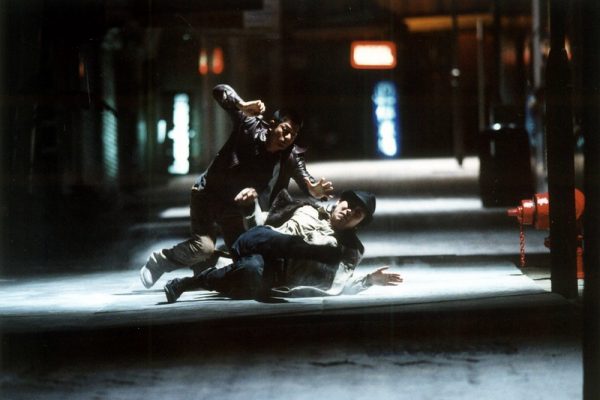Everything about Johnnie To’s eccentric judo thriller Throw Down is surprisingly heartfelt, from the central relationship between a flawed but lovable trio of characters to the director making the film as a sincere tribute to Akira Kurosawa. The Japanese master has been used as inspiration for many decades – Star Wars and The Magnificent Seven are famously based on Kurosawa films – but homage is rarely so overt, or so unashamedly gushing. The prolific To (Mad Detective, Drug War, Election) has made the interesting choice to hark back to the earliest (and generally least highly-regarded) part of Kurosawa’s career, with the two Sanshiro Sugata (Judo Saga) films. This is among the more straightforward decisions he makes in this curious movie.
Throw Down hurls together much-reduced former judo champ Sze-to Bo (Louis Koo), the brash and cheerfully pugnacious newcomer Tony (Aaron Kwok), and down-on-her-luck actor/ singer Mona (Cherrie Ying). The trio coalesces around Sze-to’s jazz club and a plan to extort large sum of cash from a local bookie (Eddie Cheung). After a series of misadventures, Sze-to eventually sets up a judo club in his bar.
Not a filmmaker afraid of idiosyncrasy, To has largely dispensed with the usual connective tissue of straight narrative in favour of almost free-associative scenes that seek to slowly flesh out the characters and the themes of friendship, redemption, and resilience. Unusually for an approach that borders on abstraction – even surrealism – it’s all presented with warmth and humour, from an odd bonding moment for the trio in a toilet cubicle to the focus on judo itself, not the most obviously sexy and cinematic of the martial arts.
To gets round this by his consummate use of blocking and lighting, which is always immaculate; his Hong Kong clad in a haze of neon both stylish and sleazy. He also references Kurosawa once more in the character of Ching (Calvin Choi), the son of Sze-to’s mentor who is suffering from early-onset dementia and is roughly analogous to the character of the mentally ill Genzaburo Higaki in Sanshiro Sugata Part II. He has a fondness for singing the theme tune of Kurosawa’s film in an Enka style, acting as a bizarre Greek chorus for the action. With stylistic touches like this, Throw Down circumvents any staleness in the action scenes. It also helps that practically everyone in the film is a judo practitioner, leading to a brilliant and hilarious mid-film brawl that spills out into the streets.
With plenty to chew on already, there are a few extra subplots and characters that leave the film a bit raggedly tangential in places, which rather compounds the elliptical narrative style. That Throw Down doesn’t hang neatly together is however part of its considerable charm. To, with something like 70 features to his name, has the same restless and anarchic spirit as the perhaps better-known Miike Takashi, and like his Japanese counterpart very rarely relaxes into straight genre exercises.
What really sets Throw Down apart is the willingness to indulge a little in some of the sentimentality that marked Kurosawa’s wartime work. This is done with investment in the characters so that even when a late-stage development occurs that could reek of melodrama, the time spent with Sze-to and Co. (plus the appealing performances) makes it feel earned. A final showdown broils with triumph in that it takes places at all, the outcome almost irrelevant, and it is genuinely moving.
The message of Throw Down is fairly simple, even if the execution is excitingly baroque. As in Kurosawa’s films, judo is a basic analogy for any action by which an individual makes a positive change to their lives. Here the art of judo is a method of redemption, comfort, and conflict resolution. It’s a worthy tribute to the spirit of a man To calls ‘the greatest filmmaker’ in an epilogue. Homage aside, Throw Down is an exciting, innovative, and inventive piece of work in its own right.
Available on Blu-ray from Mon 18 May 2020
